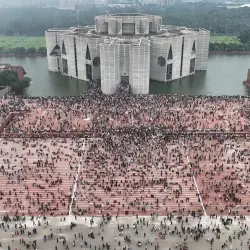The Sustainable Development Goals (SDGs) are a set of 17 global objectives that were endorsed by the United Nations in 2015 as a component of the 2030 Agenda for Sustainable Development.
The SDGs are a collection of universal objectives that apply to all nations and address a variety of concerns, such as poverty, hunger, health, education, gender equality, access to clean water and sanitation, energy, economic development, and climate change.
The SDGs are also designed to be interconnected and indivisible, which means that advancement in one area will encourage advancement in others. For instance, investing in clean energy can assist to protect the environment, while investing in education and gender equality can help to eliminate poverty.
The SDGs are intended to be universal, which means that they apply to all nations regardless of how developed their economies are. This is crucial because every nation must play a part in achieving sustainable development and will gain from a more just and sustainable world economy.
Read What are the Sustainable Development Goals? Do we need these?
The Sustainable Development Goals commitment to achieve
These objectives seek to eradicate poverty, safeguard the environment, and guarantee that everyone lives in peace and prosperity. They are applicable to all nations, regardless of how far along their economic development is. Developed countries have pledged to support developing nations in a variety of ways in order to attain the SDGs.:
- Financial assistance: Developed countries have pledged to give underdeveloped countries financial support so they can fulfill the SDGs. This involves allocating money for infrastructure improvements, healthcare and educational efforts, and other sustainable development-related projects.
- Technical assistance: Developed countries have vowed to offer underdeveloped countries technical assistance to support their implementation of the SDGs. This involves offering knowledge in fields like disaster risk reduction, sustainable agriculture, and renewable energy.
- Capacity building: Developed nations have committed to building the capacity of developing nations to achieve the SDGs. This includes providing training and education opportunities, as well as building institutions and systems that support sustainable development.
- Trade: Developed countries have vowed to establish a free and open trading system that is advantageous to both them and emerging countries. This includes opening up markets, lowering tariffs and other trade restrictions, and making sure that trade agreements are advantageous to all parties.
- Private sector investment: In order to achieve the SDGs, developed countries have also promised to promote private sector investment in underdeveloped countries. To encourage investment in sectors like infrastructure, renewable energy, and sustainable agriculture, this includes offering tax incentives, loan guarantees, and other types of support.
Developed countries have pledged to promote the SDGs through promoting private sector investment in underdeveloped countries. This entails offering tax breaks, credit insurance, and other types of assistance to entice investment in sectors including infrastructure, renewable energy, and sustainable agriculture.
Did the developed countries fulfill those commitments?
Developed nations have pledged to fund underdeveloped nations in order to help them reach Sustainable Development Goals (SDGs). To what extent these commitments have been kept, however, is difficult to say in general.
Some developed nations have worked very hard to help developing nations through capacity building, financial assistance, and technical assistance. Additionally, they have worked to stimulate private sector investment in developing nations and to establish a fair and open economic environment. Individual industrialized nations may vary in the amount of assistance they offer, and some may not have lived up to their promises.
It’s also critical to recognize that the COVID-19 pandemic has had a huge influence on the world economy and has hindered several nations’ capacity to meet their obligations. Many nations’ capacity to aid underdeveloped nations has been hampered by the need to divert resources from tackling the pandemic’s immediate effects.
It is also important to note that the SDGs are a communal obligation and that achieving them would need the efforts of all nations, actors, and groups, including rich nations, developing nations, and the corporate sector. Overall, it is evident that more effort has to be done in order for wealthy countries to live up to their promises to promote the accomplishment of the SDGs in developing nations. Governments, civil society, and the business sector must continue to collaborate to make sure that all nations have the means and capability to achieve sustainable development and enhance the quality of life for their people.















